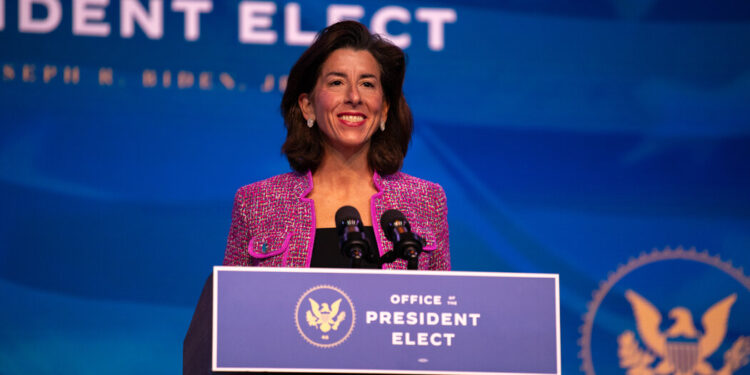Crédito: fuente
Here’s what you need to know:
Gina M. Raimondo, the Biden administration’s nominee to be the next Commerce secretary, will tell lawmakers on Tuesday that she plans to help American communities bounce back from coronavirus, aggressively enforce trade rules and try to leverage the power of the government to mitigate climate change if confirmed to a cabinet post, according to a copy of her prepared remarks.
Ms. Raimondo, who will testify before the Senate Commerce Committee, is expected to say that her experience working in the private sector as a venture capitalist and as state treasurer and the governor of Rhode Island have prepared her to help realize the Commerce department’s mission to create good-paying jobs and empower American entrepreneurs and workers.
“In this time of overlapping crises, the Commerce department must be a partner to businesses and their workers to help them innovate and grow,” Ms. Raimondo is expected to say.
Ms. Raimondo is expected to focus on her role in bringing down Rhode Island’s unemployment rate — once the highest in the nation — and will credit work force training and small business lending programs that she helped initiate. Rhode Island’s unemployment rate sat at 6.6 percent when Ms. Raimondo took office as governor in 2015. It then fell fairly steadily to a low of 3.4 percent at the beginning of 2020, mirroring a broader trend around the United States. The jobless rate has since spiked in the wake of the pandemic.
She will also focus on the effect of offshoring and factory closures on her family in the 1980s, when her father lost his job at a local watch factory and was forced into early retirement.
As Commerce secretary, Ms. Raimondo said she would help to deploy resources to businesses and workers, especially in poorer communities, to help them bounce back from the pandemic. She also pledged to work to aggressively enforce trade rules to combat unfair trade practices from countries like China, and to use the powers of her department to help reinvigorate American manufacturing and aid communities and businesses in adapting to climate change.

Every three months, corporate America gives investors a look at its books — offering updates on how sales and profits fared in the latest quarter, and usually providing a sense of what to expect from the rest of the year.
It can be an important period for the stock market, as traders learn how well their expectations matched up with reality. With the pandemic raging and the recovery floundering, earnings seasons gives investors another bead on the state of the economy.
(Earlier this month, for example, several big banks said they were cutting down reserves meant to protect against a downturn — a clear sign that they’re feeling better about things — and the news helped bolster stocks.)
But the latest earnings season also comes at a time when investors are starting to wonder if the stock market’s rally has gone too far, and whether stocks are in a bubble as prices become increasingly detached from a company’s profits and growth prospects.
How Wall Street reacts to the incoming results could help show how important (or unimportant) earnings, sales and growth are to share prices.
This week is the busiest of the fourth-quarter earnings season, with results expected from a third of the companies in the S&P 500 — including technology giants Microsoft, Apple, Facebook and Tesla. Overall, Wall Street analysts expect that profits at S&P 500 companies will be down 7 percent compared with the fourth quarter of 2019, according to FactSet data.
So far, results from the first 66 companies in the S&P 500 that reported earnings have been slightly stronger than usual. About 88 percent of those companies did better than analysts expected. Wall Street is notorious for underestimating how companies will do, but that share of companies that “beat” is higher than what’s typical.
Strangely, however, investors have seemed downright dismissive of better-than-expected earnings results, and that could be a bad omen for the market.
Usually, when a company does better than expected, its shares rise. But, through Friday, companies that beat expectations have actually underperformed the broader market, according to Bank of America analysts.
Such a reaction is yet another indication that stock prices are becoming increasingly untethered from fundamentals. In fact, Bank of America analysts noted that they haven’t seen this sort of reaction to earnings results since the dot-com bubble was beginning to deflate.
“The last time we saw such a perverse market reaction to earnings was during 2Q 2000 earnings season, after which the S&P 500 fell by 13 percent over the next three months,” they wrote.

The International Monetary Fund upgraded its outlook for the world economy on Tuesday as the rollout of coronavirus vaccines raised expectations for a stronger recovery in 2021.
The rosier outlook is welcome news for a global economy that has been battered by the coronavirus pandemic in the past year, forcing lockdowns and strict social distancing measures that have sapped business activity.
An updated World Economic Outlook report projected that the global economy will grow 5.5 percent this year after contracting by 3.5 percent in 2020. The forecast was 0.3 percentage point stronger than the fund’s October estimate.
The I.M.F. said that the economic rebound remains uneven, with some economies better able to prop up their economies with fiscal stimulus measures. It predicted the United States economy will expand by 5.1 percent this year, the euro-area economy will expand by 4.2 percent and Japan’s economy will expand by 3.1 percent.
Emerging market economies are projected to expand by 6.3 percent. In China, where the outbreak first surfaced, the economy is expected to expand by 8.1 percent.
Despite the upbeat forecast, the I.M.F. warned that the world economy is not yet in the clear. The logistics of the vaccine rollout could face obstacles and new variants of the virus present a threat. And it remains unclear how immunity to the virus will affect economic activity after so many months of strain.
“Much remains to be done on the health and economic policy fronts to limit persistent damage from the severe contraction of 2020 and ensure a sustained recovery,” the report said.

Twitter has permanently suspended MyPillow chief executive Mike Lindell — one of President Trump’s most conspicuous remaining public defenders — for peddling debunked conspiracy theories about voter fraud in the 2020 elections.
Mr. Lindell’s Twitter account, which had nearly 413,000 followers, was permanently suspended “due to repeated violations of our Civic Integrity Policy,” Lauren Alexander, a Twitter spokeswoman, said in an email.
Mr. Trump’s own account was permanently closed earlier this month for much the same reason — setting off a chain of high-profile bans imposed amid concerns that Mr. Trump and his supporters would use the platform to incite more violence, like the storming of the Capitol earlier this month.
After the Capitol attack, Twitter said it had updated its rules to more aggressively police false or misleading information about the presidential election. As part of that move, Twitter has moved to suspend the accounts of more than 70,000 people who have promoted content related to QAnon, a fringe pro-Trump group that the F.B.I. has labeled a domestic terrorist threat.
Many of Mr. Trump’s most erstwhile defenders backed away from him in the days following the Jan. 6 riot at the Capitol, which was stoked by the former president’s fiery and false speech to supporters claiming massive voter fraud. Not Mr. Lindell.
A few days after the riot, he visited Mr. Trump in the White House — where photographers captured images of his notes, which while only partly visible seemed to suggest the president impose “martial law if necessary” to remain in office.
Dominion Voting Systems, the target of his unsubstantiated claims of massive, intentional voter fraud, threatened to sue Mr. Lindell last week, describing him as a leader of a “misinformation campaign” that has resulted in significant business losses and threats of violence against Dominion employees.
On Monday, Dominion Voting Systems filed a $1.3 billion defamation lawsuit against Trump’s personal attorney, Rudy Giuliani, claiming he had personally profited by using his attacks against the company to promote commercial sponsorships.
Mr. Lindell, 59, filed a lawsuit of his own on Monday, suing the British tabloid The Daily Mail, over a recent report that he was having an extramarital affair, seeking $75,000 in damages.
His high-profile defense of Mr. Trump has earned him a devoted following on the right, but might have significant implications for his business. Bed, Bath & Beyond and several other chains have pulled MyPillow products from their shelves.

The Commerce Department has wide-ranging authority over issues as broad as technology exports and climate change. On Tuesday, President Biden’s nominee to run the agency, Gina M. Raimondo, will appear before the Senate commerce committee for a confirmation hearing. Ms. Raimondo, the current governor of Rhode Island, is a moderate Democrat and former venture capitalist.
Here are a few things to watch for as the hearing begins at 10 a.m.
Countering China’s growing technological reach
Senators of both parties are likely to question Ms. Raimondo on how she plans to use the Commerce Department’s powers to counter China’s growing mastery of cutting-edge and sensitive technologies, like advanced telecommunications and artificial intelligence.
The Trump administration made heavy use of the department’s authorities to crack down on Chinese technology firms, turning often to the so-called entity list, which allows the United States to block companies from selling American products and technology to certain foreign firms without first obtaining a license. Dozens of companies have been added to the Commerce Department’s list, including telecom giants like Huawei and ZTE.
The Commerce Department was also given responsibility for outlining President Donald J. Trump’s U.S. ban on the Chinese-owned social media apps TikTok and WeChat — actions that were subsequently halted by a court order. Mr. Biden has said he sees TikTok’s access to American data as a “matter of genuine concern,” but it’s unclear how the new administration will address these issues.
But the Commerce Department has other capabilities that some tech experts say were underused in the Trump administration, like the role it plays in setting global technology standards that private firms must operated under.
Jump-starting the economic recovery
As commerce secretary, Ms. Raimondo would wield authorities that could help struggling businesses and advance the Biden administration’s goals of building up domestic industry and revitalizing American research and development. That includes economic development programs and manufacturing partnerships that the Commerce Department offers to small and midsize enterprises, as well as its core mission of promoting American exports.
Delving into Ms. Raimondo’s past
Like some of Mr. Biden’s other nominees, Ms. Raimondo has faced a bit of backlash from progressive Democrats, who have criticized her close ties with venture capital and big tech firms. Before running for political office, Ms. Raimondo was a founding employee at the investment firm Village Ventures, which was backed by Bain Capital, and co-founded her own venture capital firm, Point Judith Capital.
Some progressives have also condemned certain actions she took as governor of Rhode Island, including clashing with unions during an overhaul of the state’s pension plans and extending some liability protections to nursing homes and health care facilities during the pandemic. But Democrats, who will support Ms. Raimondo’s speedy confirmation, are unlikely to press too hard on these issues, if at all.
Ms. Raimondo’s financial disclosure forms, released this month, also appear uncontroversial, showing an annual salary of $150,245 from the state of Rhode Island and $2.9 million to $7.5 million in cash, investment accounts and other assets, mainly mutual funds.
U.S. markets
-
The S&P 500 rose slightly in early trading Tuesday. The index has drifted near a record high for the past week.
-
Janet Yellen was confirmed as Treasury secretary on Monday and investors will be watching how she and the Biden administration move forward a $1.9 trillion stimulus proposal. Over the weekend, lawmakers from both political parties questioned whether such a large package was needed, while others expressed the need to make more aid available quickly.
-
Shares in GameStop, a struggling video game retailer, continued to rally on Tuesday. The shares have already jumped more than 300 percent this year as small investors have piled into options on the company, placing risky bets that the price of the stock will keep going higher.
Europe
-
Most European indexes gained, led by corporate deals. Shares in Naturgy Energy, a Spanish utilities company pivoting to renewable energy, rose more than 16 percent after IFM, an investment company, offered to buy a large stake. Shares in EQT, a large Swedish private equity firm, jumped 14 percent after it bought a U.S.-based real estate company, Exeter Property Group.
-
The Stoxx Europe 600 index rose nearly 1 percent.
-
European stocks and government bonds have proved resilient to the political turmoil in Italy. Prime Minister Giuseppe Conte is expected to resign on Tuesday. He’s struggled to regain support after a junior partner in his coalition government pulled out earlier this month.
British unemployment
-
Britain’s unemployment rate rose to 5 percent in the September-November period, the highest level in four and a half years. Although the government’s furlough program has prevented the rate from surging higher, there are some signs that the labor market was losing momentum late last year, during the second wave of the pandemic. For example, the number of job vacancies increased by 81,000, almost half the number from the previous quarter.
-
“While the labor market continued to deteriorate, the furlough has held back the tide on jobs losses,” said Nye Cominetti, an economist at the Resolution Foundation, a think tank. “Around one-in-six private sector workers were furloughed during England’s second lockdown in November, and even more are likely to be furloughed today.”
Asia
-
Asian stock indexes dropped on Tuesday after China’s central bank withdrew cash from the banking system and an adviser to the central bank warned about bubbles in asset prices including stocks and property.
-
The Hang Seng index in Hong Kong closed 2.5 percent lower. On Monday, it had climbed to a one-year high.

Bankruptcies fell 40 percent last year in France and Britain, and were down 25 percent on average in the European Union.
By contrast, Chapter 11 bankruptcy filings in the United States rose in the third quarter to the highest level since the 2010 financial crisis, a trend that is expected to continue in 2021, according to an index compiled by the U.S. law firm Polsinelli.
The difference is the enormous sums European countries are spending to keep businesses afloat. But some worry they’ve gone too far; bankruptcies are plunging to levels not seen in decades.
Those statistics are shaping a debate over whether Europe’s strategy of protecting businesses and workers “at all costs” will cement a recovery, or leave economies less competitive and more dependent on government aid when the pandemic recedes.
Letting unviable businesses go under, while painful, will be essential for allowing competitive sectors to thrive, said Jeffrey Franks, the head of the International Monetary Fund’s mission for France.
A wave of bankruptcies “is not something that’s necessarily so bad,” he said. “It’s part of the normal creative destruction process of regenerating economies.”

-
Leon Black, the chief executive and chairman of Apollo Global Management, announced his plan on Monday to step down as chief executive this year. The move follows an inquiry by the firm that revealed that Mr. Black had paid $158 million to the convicted sex offender Jeffrey Epstein in a five-year period ending in 2017. He had also lent Mr. Epstein more than $30 million, only $10 million of which was paid back, the report found. Mr. Black’s payments effectively bankrolled the lifestyle of Mr. Epstein in the years after his 2008 guilty plea in Florida to a prostitution charge involving a teenage girl.
-
The Norwegian Data Protection Authority said on Monday that it would fine Grindr, the world’s most popular gay dating app, 100 million Norwegian Kroner, or about $11.7 million dollars, for illegally disclosing private details about its users to advertising companies. The Norwegian agency said the app had transmitted users’ precise locations, user-tracking codes and the app’s name to at least five advertising companies, essentially tagging individuals as L.G.B.T.Q. without obtaining their explicit consent, in violation of European data protection law.

The food giant PepsiCo is jumping on the Beyond Meat bandwagon.
The two companies announced Tuesday that they had formed a joint venture called The Planet Partnership to produce a line of plant-based protein snack and beverage options.
The announcement, which did not provide details on the types of products or when they would be available.
For Beyond Meat, the relationship is an expansion beyond the meat aisle. The company, which was founded in 2009, has previously teamed up with restaurant chains like McDonald’s, Subway and Pizza Hut to test or supply plant-based burgers, meatballs and other products in the U.S. and abroad.
Beyond Meat’s stock has almost tripled from its low of $54 last March, despite the hit to its business as dine-in restaurants struggle under coronavirus restrictions. Some Wall Street analysts have warned that Beyond Meat’s adoption and sales growth could slow as large burger-focused chains like McDonald’s, Shake Shack and others focus on developing and launching more chicken-sandwich offerings.
Beyond Meat has also become another battleground between short-sellers and day traders and small investors trying to drive the stock higher and squeeze out quick profits as they did with GameStop’s stock in recent weeks. In the past two weeks, Beyond Meat’s stock has jumped to $158 from $125.








